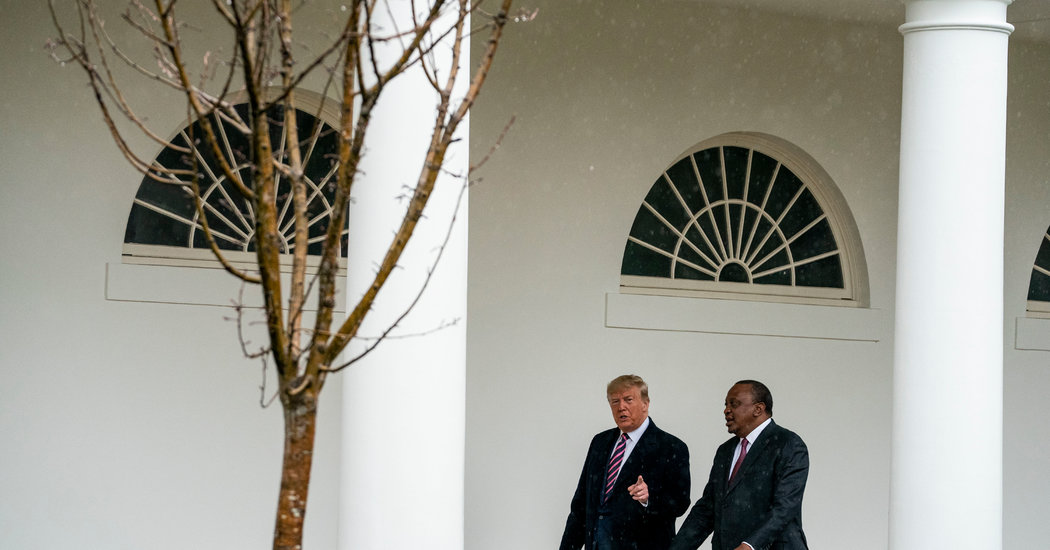WASHINGTON — The Trump administration announced on Thursday that it would begin talks for a free-trade deal with Kenya, a step partly designed to counter China’s influence in Africa.
The deal, which is likely to require many months of negotiations, would be the United States’ first trade pact with a sub-Saharan African nation and its second with an African country. It signed an agreement with Morocco in 2004.
While the agreement could help some farmers and other industries sell into and invest in Kenya, it is unlikely to have much influence on the American economy overall. Kenya is the United States’ 98th-largest trading partner in goods, with $1 billion in two-way trade in 2018, according to the Office of the United States Trade Representative. Kenya’s biggest American imports include aircraft, machinery and agricultural goods; the United States buys Kenyan apparel, tree nuts and coffee.
But the Trump administration and other officials in Washington see the move partly in geopolitical terms, believing it could provide a model for other trade deals with African countries and be a step toward countering China’s growing influence on the continent.
President Trump welcomed Kenya’s president, Uhuru Kenyatta, to the White House on Thursday afternoon to discuss the plan. When a reporter asked if he planned to sign a trade agreement with Kenya, Mr. Trump responded, “Probably.”
At the U.S. Chamber of Commerce later in the afternoon, during an event sponsored by Uber and other companies, Mr. Kenyatta said the agreement “will not only serve Kenya and the United States but will probably set the base for renewed engagement between the United States and other African countries.”
“We see clearly the opportunity that exists, and we want to be trailblazers and set a path for others on the continent to follow,” he told a gathering of American and Kenyan officials and businesspeople. He added, “Don’t let others take what should be yours.”
Robert Lighthizer, the United States trade representative, said in a statement that Kenya was “an important strategic partner of the United States, and there is enormous potential for us to deepen our economic and commercial ties.” The administration believes that an agreement with Kenya “will receive broad bipartisan support in Congress,” he added.
The Trump administration had discussed for more than two years which African country to select for trade talks — an effort explicitly aimed at countering China.
Mr. Lighthizer said in a radio interview in early 2018 that Africa was only a few years away from being the world’s population center, “and if we don’t figure out a way to move them right, then China and others are going move them in the wrong direction,” according to the publication Inside U.S. Trade.
China has lent vast sums of money to African governments and built ports, roads, airports and bridges around the continent as part of its Belt and Road Initiative. The projects include a 300-mile, $4 billion railway in Kenya that has linked Nairobi and Mombasa.
China says its investments in Africa are aimed purely at driving economic development, and many countries have welcomed improvements to their infrastructure that have aided the flow of commerce. But some projects have left governments, including Kenya’s, saddled with billions of dollars of debt to China and sparked distrust and resentment.
In a 2018 speech in Washington attended by many African officials, Mr. Lighthizer said that many African countries had signed free-trade agreements with some of America’s largest “competitors,” like the European Union and China, and that these governments were investing heavily.
“My sense, however, is that many of you recognize the value of diversifying your commercial ties, and I know you recognize what American companies bring to the table,” Mr. Lighthizer told the African officials.
Scott Eisner, the president of the U.S.-Africa Business Center at the U.S. Chamber of Commerce, said in a call with reporters on Wednesday that Kenya had made the most forceful case to the administration for starting trade talks.
“It really is who was willing to raise their hand and who had the most political will behind it,” he said.
Mr. Eisner said the trade deal could benefit American agricultural producers who would sell into Kenya; textile manufacturers looking to invest in the country; and companies, like John Deere and Caterpillar, that would sell and service equipment. But if the deal is a comprehensive, high-standard trade agreement, it probably won’t be completed this year, he said.
An agreement that addresses the bulk of trade between the countries would require congressional approval. Whether such a deal could pass Congress remains to be seen. For example, Democrats could be concerned about Kenya’s low wages and labor standards.
Nations across Africa are pursuing a large-scale effort to break down trade barriers and integrate their economies. In May, the African Union initiated the African Continental Free Trade Area, a deal aimed at breaking down trade barriers and minimizing trade disputes.
Also, preferential trading terms that the United States has offered certain sub-Saharan African countries are set to expire in the coming years. The African Growth and Opportunity Act, which allows those countries to send goods to the United States duty free, is scheduled to expire in 2025, and it’s unclear whether Congress will renew it. Over 70 percent of Kenya’s exports to the United States enter under those terms, according to the United States trade representative’s office.

